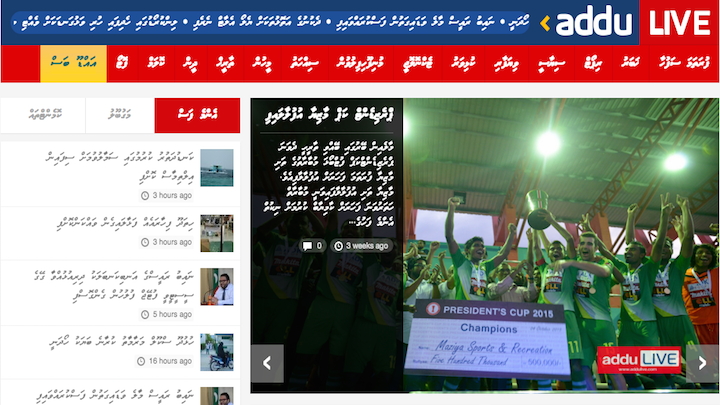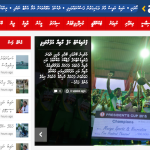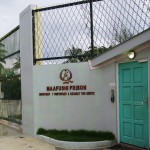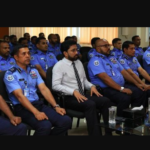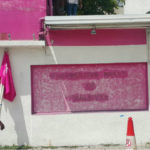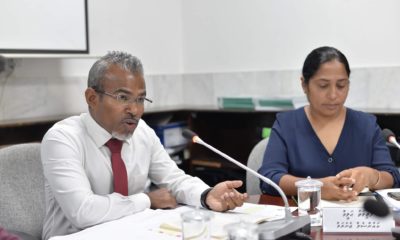The telecoms regulator has blocked a regional news website on unspecified grounds, but the paper says the ban was prompted by an article linking the first lady to corruption.
AdduLive, an unregistered outlet based in southern Addu City, is the first news website to be blocked in recent history. The move comes amidst an unprecedented crackdown on press freedom and a push by the government to criminalise defamation.
The block has prompted fears of a proliferation of underground news sites.
The Communciations Authority of Maldives said the site, which started publishing in January 2013, was blocked last Thursday on the orders of the home ministry.
“Should any government authority request us in writing, stating reasons, it is our policy that we do so accordingly,” said Ilyas Ahmed, chief executive of CAM, who refused to state reasons for the ban on AdduLive.
“There are very few websites that have been blocked. I would say it is less than ten,” said Ilyas when asked how many local websites have been blocked. “Websites can be blocked for reasons of national security and for contravening the rules of Islam. Concerned state institutions can require they be blocked,” he said, but declined to provide a list of blocked sites.
The home ministry was not available for comment at the time of going to press.
The three local internet service providers blocked access to AdduLive without warning. Dhiraagu blocked the website at 5:30pm, followed soon after by Raajje Online at 8pm, and Ooredoo at 10pm, according to AdduLive.
Two proxy websites set up by the paper were blocked on Friday and Saturday. At the moment, access to the website is only available through VPN users.
Hussain Sofwan, editor at Addu Live, said he believed the site was blocked after they published a story on April 19 about a complaint lodged at the Anti-Corruption Commission alleging that First Lady Fathmath Ibrahim was bribed for a rice import contract with the state wholesaler, State Trading Organisation.
The article was titled ‘Madam Fathun was bribed for rice import contract,’ and published with a photo of the first lady with senior officials from the STO. The article claimed a company called MM Exports was awarded a contract for importing 12,000 tonnes of rice without an open bidding process.
ACC officials could not be reached at the time of publication for confirmation.
AdduLive has previously carried several controversial stories that were not reported in the mainstream media, including an article claiming President Abdulla Yameen allowed former MP Ahmed Nazim to flee to the UK in lieu of returning to prison.
“We were informed that STO first blocked Addu Live from their servers later that day. It went on to be blocked by CAM,” Sofwan said.
In October last year, AdduLive was hacked after its journalists received threatening phone calls demanding the removal of articles on corruption of judges and news items critical of the government.
During his 30-year reign, Former President Maumoon Abdul Gayoom had blocked sites such as Maldives Culture and Dhivehi Observer, an opposition satire site set up by dissidents abroad.
Ahmed ‘Hiriga’ Zahir, editor in chief of Sun Online, told The Maldives Independent: “The constitution grants the press and other sources of information to transparently do their job. When this freedom is narrowed or hindered, it creates a chance for underground sources of information to pop up, as we saw around 2004 with Dhivehi Observer.”
The veteran journalist added: “That would take away the transparency of media, allowing for a culture of obscuring the truth, where facts are not verified, without anyone being publicly accountable for what they say.
“The media regulatory authorities need to be more vigilant in carrying out their functions and responsibilities if they are to ensure this does not happen. It is questionable whether the current broadcast commission would raise to the task.”
Zahir called on the government to pay heed to Maldives Media Council’s pleas for a self-regulatory mechanism that includes the input of a majority of media workers to regulate the press.
Recent years have seen a proliferation of regional or community-based news websites, including Manadhoo Live from Noonu Atoll, Kulhudhuffushi Online, Eydhafushi Times from Baa Atoll, and Rashoveshi from Fuvahmulah.
Sofwan said AdduLive was established “because we realised that most of the papers in the Maldives are funded by politicians and businessmen, and are used to promote particular interests.”
Noting that all mainstream media organisations were also based in the capital Malé, he added: “We wanted to bring out news about Addu, as well as the goings-on in Male’ politics. It is staffed primarily by young people from Addu who write purely out of passion and interest.”

